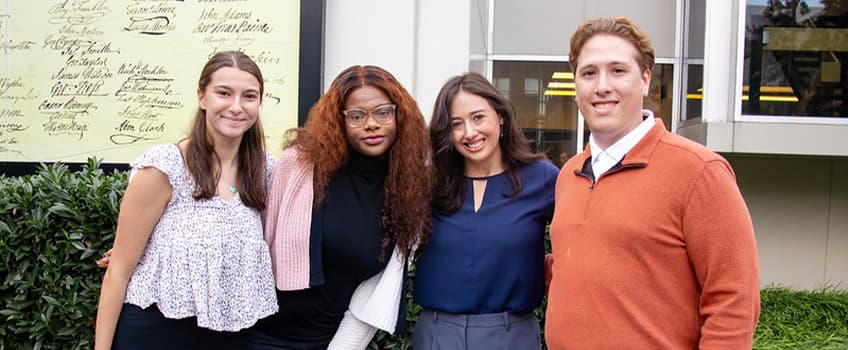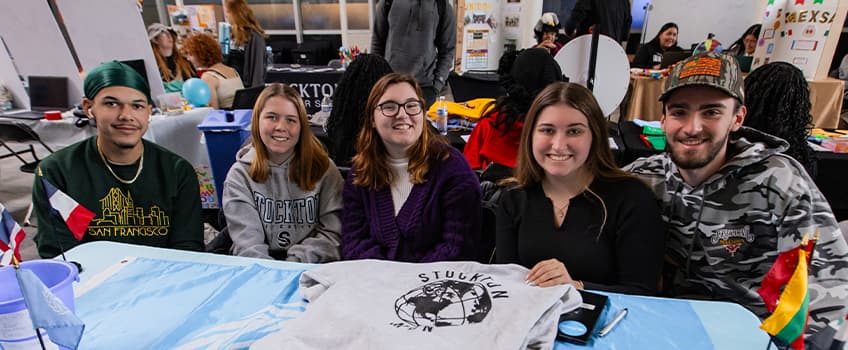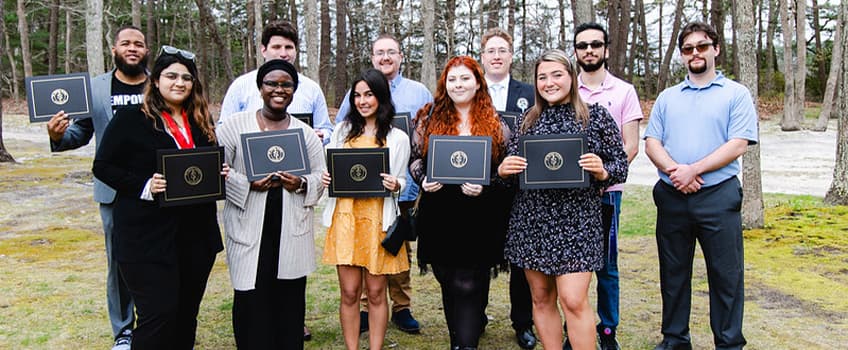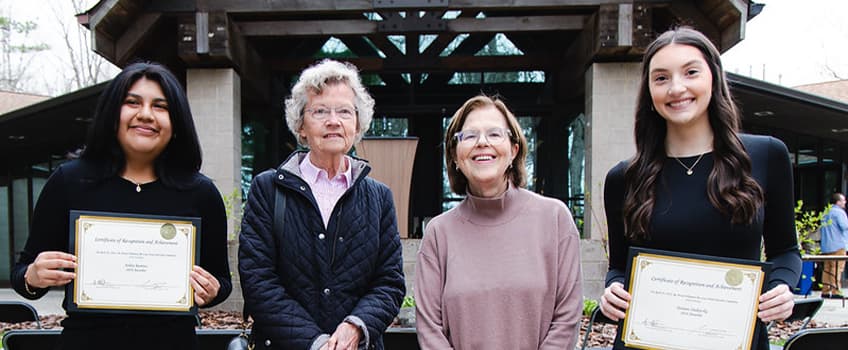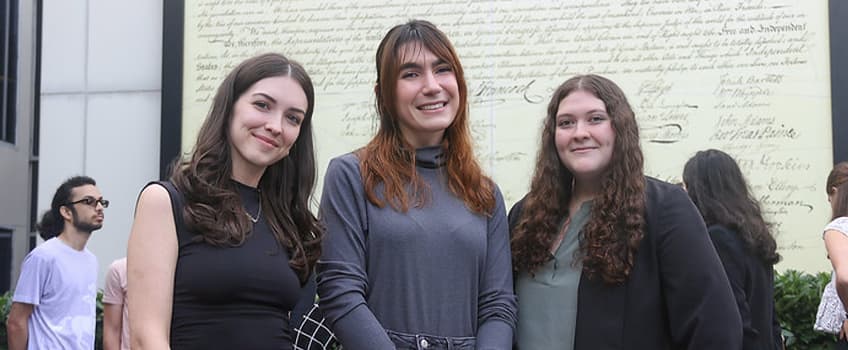Political Science
Step into the vibrant world of Political Science at Stockton University, where your passion for change meets unparalleled opportunities!
Our Political Science program offers a Bachelor of Arts (B.A.) degree with concentrations in Pre-Law, International Affairs, and Social Science Education with K-12 Teaching Certification. We also feature an innovative dual B.A./M.A. degree option, allowing you to earn a B.A. in Political Science and an M.A. in American Studies in just five years. Dive into the complexities of global and domestic politics and prepare for a distinguished future in law, governance, or education.About the Program
Political Science students have opportunities to learn from top experts and practitioners in their fields, reflecting our commitment to delivering the highest level of education at our public university. In addition to a challenging degree program, we emphasize experiential learning and other high-impact practices, providing our students with numerous opportunities to learn outside of the classroom. Our students typically add an interdisciplinary or other Minor, complete internships for credit locally or in Washington D.C., where they can live and work for an entire semester, travel abroad for 1-2 weeks as part of Stockton courses they take on campus, travel abroad for a whole semester, work with the U.S. State Department through our Diplomacy Lab program, develop and implement community-based and other research projects funded by the Board of Trustees Fellowships for Distinguished Students, complete a capstone research project in our Senior Seminar, become leaders in student clubs, earn honors distinctions, and more!
Program Chair:

Tina Zappile, Ph.D.
Associate Professor of Political Science
609-626-3816
F123
tina.zappile@stockton.edu
Program News:
-
Two Students Receive Arcuri Wharton Pre-Law Fund Awards
Monday, April 22nd, 2024 -
Program Promises Real World Experience and Credit in D.C.
Wednesday, March 20th, 2024 -
Picture Stockton... Through the Eyes of a Political Science Major
Wednesday, December 13th, 2023
The Political Science department at Stockton was incredibly helpful in shaping my goals, dreams, and skills. There was a wide variety of classes offered that both sparked my interest and allowed so much personal growth as well as facilitating independent thinking. I was lucky to have amazing professors who guided me on my pursuit of law school and who have continued to provide mentorship over the years.
Stockton Political Science Major '16
Stockton’s extensive alumni network of law students and lawyers provides invaluable contacts in the professional world that help enormously in law school and after graduation.
Stockton ’06, Rutgers Law ‘09
Stockton’s Political Science pre-law courses immerse students in an environment indistinguishable from that encountered in law school. In doing so, graduates enter law school with a sense of confidence and determination.
Stockton ’11, Villanova Law ‘14
Stockton’s Political Science pre-law courses immerse students in an environment indistinguishable from that encountered in law school. In doing so, graduates enter law school with a sense of confidence and determination.
Stockton ’14, Rutgers Law ‘17
Professor Wharton’s assistance in crafting personal statements, preparing for the LSAT and providing overall support for students applying to law school is invaluable.
Stockton ’13, Rutgers Law ‘16
B.A. Curriculum
Political Science is the study of politics, which is the process of decision-making that shapes how we govern our societies. It is focused on the analysis of power, relationships, and decision-making patterns that shape and determine the outcomes of vital social, economic and policy issues. Therefore, much of political science involves the study of government (the arena in which public issues are raised and resolved), the study of human behavior (as a social science, politics is done by people), the study of public policy (the outcome of many decisions in government), and the study of institutions (the places or venues through which governance occurs).
Political Science majors are highly encouraged to study abroad, complete an internship for academic credit, conduct independent research or propose a community-based project, and add a Minor and/or Certificate to complement their degree.
Our students work directly with a preceptor (i.e., faculty advisor) to define a series of courses for their degree program that reflects their special academic interests and enhance their career preparation.
Curriculum Worksheet
4-Year Degree Maps
Review our degree maps to learn how you can graduate in 4 years with our B.A. degree options:
Our B.A. degree options are flexible
Our degree provides students the flexibility to determine their own focus and field of interest. To receive a B.A. degree in Political Science, a student is required to complete:
- A minimum of 40 credits (10 courses) in Political Science
- 24 credits (six courses) in Cognate areas, and
- 64 credits (16 courses) in General Studies and At-Some-Distance (ASD).
There are four specific required courses for all majors. As part of their 40 credits (10 courses) in POLS courses, all our majors regardless of their concentration must take the following:
- Introduction to American Politics (POLS 2100)
- Political Methodology (POLS 3150)
- Senior Seminar (POLS 4695) and
- CIST 1206 Statistics; for students admitted in Fall 2023, this will automatically be a part of their Cognate requirement of 24 credits (6 courses). Students who were admitted prior to Fall 2023 may request that CIST 1206 be moved to their Cognate area with preceptor approval.
The remaining 28 credits (7 courses) in POLS are electives, and if a student takes more than 40 POLS credits the additional POLS courses will automatically count towards their Cognate requirement. Other Cognate courses include historical studies, criminal justice, economics, anthropology, psychology, social work, sociology, gerontology, public law, or philosophy (only PHIL1203 and PHIL1204).
All our students are strongly recommended to take POLS 1100: Introduction to Politics (offered each semester).This course provides an integrated overview of the discipline, including the basic theories, concepts, approaches, and enduring questions of political science. It provides students with a foundation of knowledge and analytical skills necessary for an individual interested in politics. We also recommend that students take a variety of introductory courses at the 2000-level, each representing the major areas within political science. More advanced specialized courses are offered at the 3000-4000 level, and we strongly recommend (and sometimes require) students wait until their junior or senior year before taking more specialized courses. Students should choose a variety of course formats and modalities (e.g., lecture, seminar, online, hybrid, in-person, independent study, etc.).
Please note, POLS majors must take POLS 1100 and 2100 before they earn 76 credits. CIST 1206 must be taken before POLS 3150, and POLS 3150 must be taken before students earn 95 credits. POLS 4695 Senior Seminar may only be taken by students in their last semester in residence at Stockton; students must have completed POLS 3150 and CIST 1206 with a passing grade or, alternatively, must be currently enrolled in POLS 3150 at the time they register for Senior Seminar and must subsequently complete it with a passing grade. Students who wish to take Senior Seminar before their last semester in residence at Stockton may request permission from the Political Science program, provided they will have completed a minimum of seven Political Science courses (including POLS 3150 Political Methodology and POLS 2100 Introduction to American Politics) before the start of Senior Seminar. Requests must be submitted in writing to the program chair prior to registering for POLS 4695 Senior Seminar.
Note: The University Bulletin includes a summary of our degree requirements; the requirements for your degree depend on your date of matriculation. Please search for "Political Science" in the current University bulletin for complete details.
General Political Science
POLS 1100 Introduction to Politics
POLS 3150 Political Methodology* (CIST 1206 Statistics is a prerequisite)
American Politics
POLS 2100 Introduction to American Politics*
POLS 2211 Law and Legislative Process (also under Law)
POLS 2222 President and Congress
POLS 3235 American Political Behavior and Representation
POLS 3260 Interest Group Politics
POLS 3610 Voting in America
POLS 3616 Political Parties
POLS 3625 Campaigns and Elections
Policy and Public Administration
POLS 2180 Introduction to Public Administration
POLS 2190 Introduction to Public Policy
POLS 2209 State and Local Government
POLS 2245 Race and Politics
POLS 3345 Politics of Immigration
Political Theory
POLS 2140 Introduction to Political Theory
POLS 3667 Political Theory of the African American Experience
*Required courses
International Relations and Comparative Politics
POLS 2160 Introduction to Comparative Politics
POLS 2170 Introduction to International Politics
POLS 2274 U.S. Foreign Policy
POLS 3313 International Order
POLS 3360 Comparative Politics of Human Rights
POLS 3628 Contentious Politics in Comparative Perspective
POLS 3658 Politics in Film and Literature
POLS 3645 Politics of Transitional Societies
POLS 3662 International Political Economy
Law
POLS 2215 Law School Basics
POLS 2211 Law and Legislative Process (also under American Politics)
POLS 3123 Judicial Process
POLS 3221 Constitutional Law
POLS 3225 Civil Liberties
POLS 3612 Gender and the Law
Internships
POLS 3900 Political Science State/Local Internship
WASH 3620 Washington Seminar
WASH 3940 Washington Internship
Senior Capstone
*POLS 4695 Senior Seminar
Required courses for concentrations:
The International Affairs concentration is designed for students who plan to pursue careers in international affairs, broadly defined. Courses in this concentration provide instruction in fields of comparative politics, international relations, global governance, and foreign policy with an emphasis on economics, security, human rights, transitional societies, and diplomacy. Students are encouraged to focus on a skill such as language(s) or GIS and other types of data analysis.
Students seeking this concentration are strongly recommended to enhance their coursework with study abroad, short-term study tours, and student clubs such as Model UN or those focusing on specific regions or issue areas of global concern. Political Science also makes available opportunities to attend panels, workshops, and networking events in the New York, Washington, DC, and local area.
REQUIREMENTS
To obtain the International Affairs concentration, students must take a total of 6 courses or 24 credits. Students seeking certification in the International Affairs concentration must also follow the designated advising curriculum in Blackboard for this concentration and are strongly encouraged to meet regularly with Dr. Tina Zappile and their preceptor.
Required Courses (2 courses)
POLS 2160 Introduction to Comparative Politics
POLS 2170 Introduction to International Relations
Core Courses (select any 3 or 4 courses)
HIST/POLS 2146 Indian Ocean History
POLS 2140 Introduction to Political Theory
POLS 2274 US Foreign Policy
POLS 3313 The International Order
POLS 3345 Politics of Immigration
POLS 3360 Comparative Politics of Human Rights
POLS 3628 Contentious Politics in Comparative Perspective
POLS 3645 Politics of Transitional Societies
POLS 3658 Politics in Film and Literature
POLS 3662 International Political Economy
POLS 3800 or 4800 Independent Study (with permission)
Optional Elective Course (select up to 1 course): We will consider many courses strongly related to International Affairs for this requirement, for example LANG courses, GIS courses, and more.
Please contact Dr. Zappile at tina.zappile@stockton.edu or Professor Balasco at lauren.balasco@stockton.edu for more information.
A degree in Political Science can provide excellent preparation for a career in teaching. This concentration helps prepare students for this career, with a particular focus on social studies education. Students seeking teacher certification must meet both the requirements for graduation in Political Science and the state requirements for teacher certification.
Since several of the state requirements can be met by the same courses that are required for the Political Science major, it is highly recommended that students meet regularly with their program preceptor as well as their Education preceptor to maximize strategic course selection. Political Science faculty are familiar with the content knowledge requirements of the Praxis teacher licensure and certification exam, and much of the skills and knowledge requirements of this exam are incorporated into the Political Science curriculum.
Students interested in pursuing teaching certification should also regularly consult their assigned Education preceptor, the School of Education staff and/or the Bulletin site for the most up-to-date curriculum information to meet program and state requirements. This includes important information on entrance requirements that must be met before professional education courses can be taken including a state-mandated entrance exam (Praxis Core or equivalent). Failure to meet these requirements can mean a delay in study. Concentration requirements can change frequently, as state requirements for teacher certification and the related requirements of the School of Education are revised.
REQUIREMENTS
The NJ Department of Education requires a 3.0 cumulative GPA to be certified. Current state requirements for social studies teacher certification require a minimum of 30 credits of study in the area of social studies, including 12 credits at the 3000/4000 level and 15 HIST credits (at least 1 American and 1 World History course).
All grades for courses counting towards certification must be a C or better. This includes POLS 3150 Political Methodology.
This concentration defines a designated set of options in Political Science and other courses that can help students meet both sets of requirements. Students must also take specific Education courses set forth in the School of Education’s Curriculum Worksheet: POLS-Educ Concentration.
In addition to required Education courses, students pursuing this concentration are strongly encouraged to consider the following core courses to satisfy these requirements:
Political Science*
- POLS 1100 Introduction to Politics
- POLS 2100 Introduction to American Politics
- POLS 2140 Introduction to Political Theory
- POLS 2160 Introduction to Comparative Politics
- POLS 2170 Introduction to International Relations
- POLS 2190 Introduction to Public Policy
- POLS 2211 Law & Legislative Process
- POLS 2222 President and Congress
- POLS 2245 Race and Politics
- POLS 3221 Constitutional Law
- POLS 3222 Civil Liberties
- POLS 3345 Politics of Immigration
- POLS 3612 Gender and the Law
- POLS 3625 Campaigns and Elections
*A minimum of 12 credits at the 3000/4000 level needed to meet teacher certification requirements.
Economics
- ECON 1200 Introduction to Macroeconomics
- ECON 3636 Political Economy
- POLS 3662 International Political Economy
- Or alternate ECON course with approval of preceptor
U.S. History*
- HIST 1152 Introduction to U.S. History to 1865
- HIST 1153 Introduction to U.S. History Since 1865
- HIST 2152 North American History to 1789
- HIST 2153 U.S. History 1789-1865
- HIST 2162 U.S. History 1865-1920
- HIST 2163 U.S. History Since 1920
- HIST 2331 African-American History Since 1865
*A minimum of one course required for certification with a C or better.
World History*
- Early Western or European History
- HIST 1310 History of Early Christianity
- HIST 2116 Ancient Mediterranean History
- HIST 2120 Europe: 1400 to 1815
- HIST 2121 Europe: 1815 to the Present
*A minimum of one course required for certification with a C or better
Modern Western or European History
- HIST 2117 Modern Germany
- HIST 2118 Europe in the Twentieth Century
- HIST 2122 Modern Britain: 1688 to Present
- HIST 2135 Modern Russian and Soviet History
African, Asian, or Latin American History*
- HIST 1160 Latin American History Political Development
- HIST 1161 Latin American Social History
- HIST 1170 Asian History
- HIST 2106 Modern Middle East History
- HIST 2128 Atlantic History
- HIST 2140 History of India
- HIST 2146 Indian Ocean History
*A minimum of one required for certification
Geography
- POLS 2160 Introduction to Comparative Politics
- ENVL 2100 Physical Geography
- GIS 3625 Global Geography
-
Or alternate course with approval of preceptor
Psychology*
- EDUC 2231 Development of the Learner (1 course) OR PSYC 3391 Educational Psychology AND PSYC 3322/3323 (3 courses)
*Required cognate for EDUC concentration students only.
Students interested should meet with Professor Claire Abernathy to work out a coherent program tailored to their needs and interests: claire.abernathy@stockton.edu.
All Political Science majors can join our Honors Society!
Stockton’s chapter of the Pi Sigma Alpha honor society (Alpha Zeta Rho) is open to students who have completed five POLS courses (3 introductory and 2 upper-division) and have a minimum B average in their POLS courses. Membership in the chapter includes the option of commencement regalia (honor cord/medallion), scholarships for Washington Internships, competitions for chapter activity grants and student papers, participation in the honor society’s national student conference, consideration for higher entry-level positions in federal employment than nonmember applicants, the Pi Sigma Alpha Newsletter, and the Pi Sigma Alpha Undergraduate Journal of Politics. Please contact the chapter adviser, Dr. Lauren Balasco, for additional information: lauren.balasco@stockton.edu.
![]()
Learning Outcomes
Upon completion of the program, POLS graduates should be able to:
Conduct Political Analysis. This is defined as the ability to apply qualitative and/or quantitative methods to critically analyze a social or political question related to any field of political or social science that may include (1) political theory, (2) legal/Constitutional issues, (3) American or comparative political institutions, (4) American or comparative political processes, (5) international relations, or (5) American or comparative political behavior.
Demonstrate critical thinking through logical argument. We define critical thinking as the ability to (1) Clearly and comprehensively explain issue(s)/argument to be examined, (2) Clearly present an argument or thesis to be defended, (3) Clearly present evidence in support of argument/thesis, (4) Thoroughly analyze own and others’ assumptions and carefully evaluates the relevance of contexts when presenting position, and (5) Draw conclusions that are logical and reflect an informed evaluation of the evidence presented.
Communicate effectively through writing. This is defined as demonstrating political knowledge, analysis, and critical thinking skills through writing. We teach elements of writing that we value in several courses, with all of our students completing at least two (2) major research projects with article-length papers.
Dual Degree (M.A.) 4+1 in POLS/American Studies
Unlock the fast track to advanced academic achievement with our dual degree concentration in POLS/American Studies, designed for high-achieving undergraduates.
This dual degree concentration allows students to earn their M.A. degree with one additional year of study. This is achieved by successfully completing POLS 4695 (Senior Seminar) and up to three graduate-level courses during your senior year. Two of these courses should be AMST 5000 (Proseminar) in the fall semester and AMST 5001 (Research Methods in American Studies) in the spring semester. The third may be any graduate-level elective or shared-space undergraduate/graduate elective in either the fall or spring semesters.
Students interested in the dual degree concentration should speak to their preceptors and the American Studies chair before declaring the concentration in Degree Works.
Minor in Political Science
The POLS Minor is designed to be flexible for students who desire a background in government and politics.
It can be completed by taking a total of 5 courses in the following fields of study: American Politics, the Law, Public Policy, Comparative Politics, International Relations, and Political Theory. The following are the requirements for the POLS Minor, for a total of 5 courses:
-
Two Political Science courses at the introductory 1000-2000 level.
-
Two upper-level Political Science courses at the 3000 level or above (no more than one 4-credit internship may be counted for the minor).
-
One Political Science course at any level.
Students can add their own POLS minor through Go Stockton portal. Access your Student Services tab > Student Tools > Change of Major/Minor.
Students can contact the chair, Dr. Tina Zappile, to work out any issues or concerns about the minor to meet their needs and interests: tina.zappile@stockton.edu
Pre-Law Concentration
The B.A. in Political Science, Pre-Law concentration is designed for students who plan to attend law school.
Stockton’s Political Science graduates have had extraordinary success in gaining admission to law school. This success comes from students taking advantage of a rich array of legal studies courses that both help them get into law school and prepare them for success throughout their legal education. Courses in this concentration provide instruction in substantive areas of law and enhance students’ skills in analytical and critical thinking, legal reasoning, writing, and comprehending judicial opinions. The concentration is also valuable to students interested in paralegal careers. Students seeking certification in the pre-law concentration must consult with their program preceptor once each semester and obtain approval of selected courses.
Pre-Law Coordinator:

Lauren Balasco,PhD
Associate Professor of Political Science
Requirements:
To obtain a B.A. in Political Science in Pre-Law, students must take at least seven courses including two required courses and any combination of five POLS or Cognate courses listed below.
Please note: pre-law students are still required to take 40 POLS credits (10 courses) to graduate; the pre-law Cognate courses will count towards the Cognate requirement of 24 credits (6 courses). There are some exceptions to the requirement of 10 POLS courses for select students who were admitted prior to Fall 2022. Please consult with the Program Chair if you have any questions or concerns about your specific requirements for graduation.
Two Required Pre-Law Courses:
- POLS 2215 Law School Basics
- POLS 3225 Civil Liberties
Any Five Additional Pre-Law Courses from either of the following lists:
a) Recommended Pre-Law POLS Courses:
- POLS 2190 Introduction to Public Policy
- POLS 2211 Law and the Legislative Process
- POLS 2245 Race and Politics
- POLS 3221 Constitutional Law
- POLS 3313 The International Order
- POLS 3360 Comparative Politics of Human Rights
- POLS 3612 Gender and the Law
- WASH 3620 or 3940 Washington Internship*
- POLS 3900 Political Science State/Local Internship*
- POLS 4800 Independent Study (only those in the Law or the Judiciary)*
- Approved elective
b) Recommended Pre-Law Cognate Courses:
- PHIL 1204 Symbolic Logic
- PLAW 2120 Business Law I
- PLAW 3110 The Legal, Social and Ethical Environment of Business
- PLAW 3630 Health Law and Policy
- SUST 3300/POLS 3300 Environmental Policy and Law
- GIS 3646 Constitutional Law: Stories & History
- Approved elective
*Internships & Independent Studies: With preceptor approval, state/local internships or Washington internships that provide direct experience in law or the judiciary may satisfy one of the required courses for the pre-law concentration. Additionally, law-specific Independent Study courses can count towards pre-law with preceptor approval.
Alan F. Arcuri Pre-Law Fund Award
Alan. F. Arcuri Pre-Law Fund Award The Stockton University Foundation will solicit applicants applicants for its Alan F. Arcuri Pre-Law Fund Award annually. This fund, in memory of Alan F. Arcuri, Emeritus Professor of Political Science, who passed away on November 20, 2017, will support Stockton students who are preparing for admission to law school by providing a stipend to pay for an LSAT preparation course. Professor Arcuri was instrumental in establishing Stockton’s Pre-Law program. As Stockton’s Pre-Law advisor, he mentored scores of students in their path to law school and a career in law. Professor Arcuri worked tirelessly with students to enhance their chances of obtaining admission to law school. This funding opportunity is open to all Stockton University undergraduates who are currently juniors (earned 64-95 credits) or seniors (earned 96+ credits). Preference will be given to juniors and seniors who major or minor in a program within the School of Social and Behavioral Sciences (SOBL). Applicants must have a minimum cumulative GPA of 3.0 at Stockton. If you have any questions, you can e-mail Linda J. Wharton, Professor of Political Science & Pre-Law Advisor at Linda.Wharton@stockton.edu.
Internships, Research, Clubs
The Political Science program offers numerous opportunities to enrich classroom-based learning.
State and Local Internships
Apply for a Distinguished Student Fellowship
GET INVOLVED! Join Student Clubs and Organizations!
Each semester, you can attend the Get Involved Fair where students can learn more about these opportunities. For up-to-date information on student clubs and events, please visit Osprey Hub, the one-stop-shop for all student activities & events! Model UN brings students to Washington D.C. and New York City and abroad each year. Law Society, Minorities in the Law, and Mock Trial provide opportunities for pre-law students to gain skills and network. Stockton Democrats and Stockton Republicans have co-created campus debates for Presidential elections and more. Amnesty International is a local chapter that works with the campus and community to increase awareness and take action on human rights. In 2023, Amnesty hosted the Director of Amnesty-USA at Stockton for an on-campus event!
Work on Civic Engagement
The American Democracy Project at Stockton is a University-wide initiative that is connected with national projects co-sponsored by the American Association of State Colleges and Universities (AASCU), and participating campuses. University faculty participating in these projects foster civic and political engagement of students through a variety of types of programming, including Constitution Day, field trips, speakers, and alumni presentations. As a result of its excellence in these programs and others, the University has been recognized by the Carnegie Foundation as meeting the standards for being designated as a “Community Engaged Institution.” Please contact Professor Claire Abernathy for more information: claire.abernathy@stockton.edu.
Connect Here to the American Democracy Project/Political Engagement Project (ADP/PEP)
Washington D.C. Internships
The Washington Internship Program is an extraordinary opportunity to spend an entire academic term (Fall/Spring/Summer) in Washington, D.C., working in various settings and completing an entire semester’s worth of credits (16 credits) that count towards your graduation requirements. Participants in the program work in governmental, political, nonprofit, and private sector settings. Students apply and, if accepted, go through an internship placement process where they are invited to interview and consider offers before they commit. Additionally, they have a choice about which class they take while in D.C.
Intern or Conduct Research for the William J. Hughes Center for Public Policy
The Hughes Center for Public Policy provides students with opportunities to be engaged in applied research and to participate in an annual cycle of events that bring speakers to campus. Political Science students have conducted research through Hughes Center internships and other opportunities. Students can also work in the Center's Stockton Polling Institute: "Stockton Polling Institute tracks public opinion through the use of a student-based interview team of over 120, thus providing students with a first-hand opportunity to learn about public opinion and policymaking". The Hughes Center sponsors a Legislator-in-Residence program that gives students the opportunity to interact with members of State government from both parties in the classroom.
Research projects start in the classroom!
You can present your research at a conference, publish in a journal, and more! Most projects begin in class, especially in POLS 3150 Political Methodology and/or POLS 4695 Senior Seminar. They can also begin as shorter papers or projects in classes that fit your interests, maybe in the law or international affairs. Students can also request Independent Studies from faculty in the areas they are are interested in, and faculty can help students shape an idea into a full-blown research project! Political Science students can submit their work for presentation at the American Political Science Association (APSA), International Studies Association (ISA), and other national or regional conferences. In 2023, then-junior Joseph Wozniak presented his work with Professor Ning Lao at the ISA-Northeast conference and in 2024, as a new Stockton graduate, he will present at the 2024 APSA national conference in Philadelphia. In 2024, graduating senior Dylan Irmiere (shown in the image) presented his year-long project titled "Jersey Shore Sentiments – New Jersey Residents’ Outlook on Offshore Wind Farms on the Horizon" at the NJ-EDA WInd Symposium at Kean University. Students can also publish their work in the Pi Sigma Alpha Undergraduate Journal of Politics, with an October 1st deadline for the fall and February 1st deadline for the spring. Please reach out to Professor Lauren Balasco for guidance on publishing: lauren.balasco@stockton.edu.
Political Science Faculty
Check out the SOBLime Times for updates on the work of our faculty!

Claire E. Abernathy, Ph.D. (Vanderbilt University)

James Mac Avery, Ph.D. (University of Kentucky)

Lauren Marie Balasco, Ph.D. (University of Delaware)

Maxwell G. Burkey, Ph.D. (The Graduate Center of the City University of New York)

Ghaidaa Hetou, Ph.D. (Rutgers University, New Brunswick)

Tracy Maksel, Ph.D. (Walden University)

Michael S. Rodriguez, Ph.D. (Temple University)

Lauren Rowlands, Ph.D. (Temple University)

Eileen Twiggs, J.D. (Yale Law School)

Linda J. Wharton, J.D. (Rutgers School of Law, Camden)

Tina M. Zappile, Ph.D. (University of Nebraska - Lincoln)
Associated Faculty

Patrick Hossay
Professors Emeriti

David L. Carr

William T. Daly

Jacqueline Pope

G. William Sensiba
Careers
